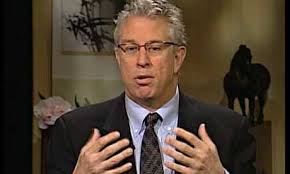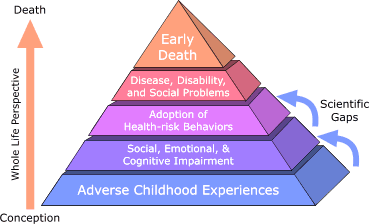Address to The National Council for Behavioral Health
Washington, DC, May 4, 2014 – Click link or photo for video
https://www.youtube.com/watch?v=M6kDeBaJi0M
“Empathy is what makes us human,” says brain scientist Dr. Bruce Perry, MD – but this has not sunk in for Americans. If simple kindness isn’t enough, what about the minor fact that it’s brain science? Or that by ignoring this basic fact, we’re violating biology, so we’re dying as a species?
To let Dr. Perry make his point, today I’ve just got a few quotes from his May 4 Washington DC address, to provoke you to watch the video kindly posted by the National Council for Behavioral Health.
”From birth, we seek intimate connections, bonds made possible by empathy — the ability to love and to share the feelings of others,” Perry begins. But “our policies routinely violate the biological reality of empathy, and that’s destructive…
“For example, we pass on to the next generation explicit choices that we’re going to teach math — but not music…We don’t care if everyone learns to read and perform music or not, but they’ve got to do arithmetic… We have extensive rules for all the things everyone has to learn to drive a car… but we don’t do the same for raising a child! We don’t make any systematic recommendations, or ensure that everybody who’s about to have a child has the fundamental knowledge of what’s necessary for the child…
“We’re exposing our children to levels of violence as a problem solving technique, at rates that are at least 50 times greater than alternate methods of problem-solving…
“We have invented ourselves into a corner with technology… into models of child rearing, education, and building communities that is fundamentally disrespectful of two of the greatest (biological) gifts our species has: the fundamental malleability of the human brain in early life, and the fundamental relational (empathic) nature of human beings…. As a result we are much more vulnerable to mental health, social health, cognitive health, and physical health problems.
Humans Need Humans Around to Live
 “Human beings are biological creatures with genetic gifts… The only way we survived was by forming relationships, collaborative relationships… Human beings are neurobiologically meant to be connected to others: to live, work, hunt, play, invent, and die in groups.
“Human beings are biological creatures with genetic gifts… The only way we survived was by forming relationships, collaborative relationships… Human beings are neurobiologically meant to be connected to others: to live, work, hunt, play, invent, and die in groups.
“We use the word ‘independent’ a lot — but the truth is there’s not a single human on this planet, ever, that’s been independent. All of our physiology is designed to connect to others, we have huge parts of our brain designed purely to respond to the non-verbal cues of others… it’s in the way our face is oriented, our facial configuration is forward, looking at people… We have sensory apparatus on our skin that’s meant to be touched… so that we can feel somebody caress us…
“Our brain is a social organ; we are social animals. We don’t have any natural body armor, camouflage, stinging other things. We form groups! Human beings are ‘meat on feet’ to the natural world! The only way we survive is by forming collaborative groups, by sharing what we hunted and what we gathered with everybody else in our group. And the typical living group was a developmentally heterogeneous, multi-family, multi-generational group: 40 to 50 people.
“And in that group… the ratio of developmentally more mature individuals who cared for you, protected you, nurtured you… was four to one. But now, we think it’s an incredibly enriched early child care environment if there’s one caregiver to six kids! That’s 1/24 the relational density the brain benefits from…
“Today, the whole organization of society flies in the face of this… In the last census, one third of American households were one person.
“On top of which, now… the typical American spends 11 hours a day interacting with digital devices, and not with fleshy objects! And I want to talk about the consequences of this for how we end up expressing our ability to be compassionate (or not)…. You see it all the time, complaints in the psychological literature about the disconnectedness of multi-tasking constantly with our phones… but we do it ourselves… You’re talking to someone, then your phone will vibrate — and it pulls you away from them.
” It breaks the rhythm of social contact, of empathic engagement– and the truth is: those things are physiologically meaningful.”
Again, click here for video:
https://www.youtube.com/watch?v=M6kDeBaJi0M
—————————–
Kathy’s news blogs expand on her book “DON’T TRY THIS AT HOME: The Silent Epidemic of Attachment Disorder—How I accidentally regressed myself back to infancy and healed it all.” Watch for the continuing series each Friday, as she explores her journey of recovery by learning the hard way about Attachment Disorder in adults, adult Attachment Theory, and the Adult Attachment Interview.
![]()




Pingback: Bruce Perry: No Empathy, No Survival | "Do...